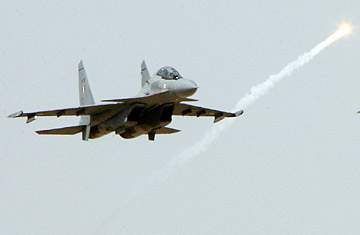
An Indian fighter jet takes part in a bombing exercise
A purported midnight incursion of Indian air force jets into Pakistani airspace Saturday brought tensions between the two nuclear-armed neighbors to an even higher pitch in the wake of the attacks on India's financial capital of Mumbai that killed 171 last month. Within minutes, the Indian jets were chased back by the Pakistani air force, say Pakistani officials, and retired air force commanders interviewed on Pakistani TV swore to defend their nation. The Pakistani air force claimed that Indian planes intruded as much as 2 miles (4 km) into the country, but the government says it accepted Indian assurances that the incursions were inadvertent. The Indian government, for its part, denied publicly that an incursion took place at all. Pakistani President Asif Ali Zardari dismissed the incident at a joint press conference with British Prime Minister Gordon Brown on Sunday, calling it a "technical incursion — two planes flying 50,000 miles up in the air; when they turned, they slightly entered Pakistan soil." Brown was in Islamabad after visiting India and Afghanistan to discuss security in the wake of the Mumbai attacks.
Still, the planes allegedly entered Pakistan near the two cities of Lahore and Muzaffarabad, where the banned militant group Lashkar-e-Taiba — which has been accused by Indian and British investigators of planning the Mumbai attacks — had been allowed to operate under the aegis of its charitable wing, Jamaat-ud-Daawa, until its leader was put under house arrest on Thursday. Pakistani analysts suggest that the "inadvertent" incursion may have been a warning that if strong action was not taken against the accused terror group by Pakistan, India would take matters into its own hands. Zardari stressed that his government was doing all it could to help in the investigation, and complained that doubts about its efforts were unhelpful. "We are investigating, and the Indians say they are investigating, but to say that we could come up with proof before they can would be asking too much from us," he said. (See pictures of the Mumbai aftermath.)
Scores of Jamaat-ud-Daawa leaders and activists were detained throughout the country and later requested sanctions after the United Nations Security Council declared their organization a terrorist group. However, inspector-general Shaukat Javed of the Punjab Police says many of those placed under detention will have to be freed if evidence of their involvement in the Mumbai attacks is not quickly produced by India, according to the News, a Pakistani English daily.
Pakistani government officials have been vocal with their frustration of what they call a lack of concrete evidence linking the group, which has strong ties to the Pakistani military intelligence community, to the terrorist attacks, despite intercepted mobile-phone conversations between the attackers and their handlers in Pakistan. Lashkar-e-Taiba was founded with the assistance of the directorate for Inter-Services Intelligence (ISI) in 1990 to serve as a proxy fighter in the disputed territory of Kashmir. The ISI has been repeatedly accused by U.S. officials of maintaining links to the terrorist group, which was involved in an attack on the Indian Parliament in 2001. That incident brought the two countries to the brink of war. In 2002, Lashkar-e-Taiba was banned, but it quickly resurfaced under a different name. Parts of the ISI, which still maintains that India is Pakistan's principal threat, are loath to crack down on such a militant asset.
At the press conference, Brown pledged a $9 million "comprehensive antiterror program" that would "ensure everything is done to make sure terrorists are denied any safe havens in Pakistan." Three times during the conference Brown stressed that at least three-fourths of all terrorist attacks in Britain had links to al-Qaeda in Pakistan. But he also said that Pakistan was itself a victim of terrorism, having suffered some 50 suicide attacks this year alone. The antiterrorism package, which Brown called the largest of its kind from his country, would include information-sharing, assistance with bomb-detection devices, forensics and education. "Through these measures we hope to do more to break the chain of terror that links the mountains of Afghanistan and Pakistan to the streets of the U.K. and other countries around the world," he said.
Brown also said that Britain had agreed to provide the Pakistani government more information about the Mumbai attacks. Now it's up to the new civilian government to prove it can act on it.
